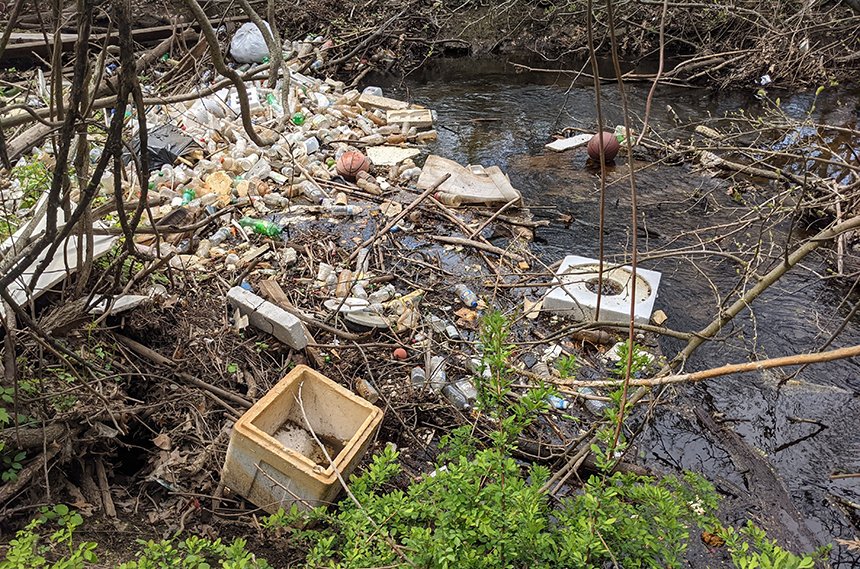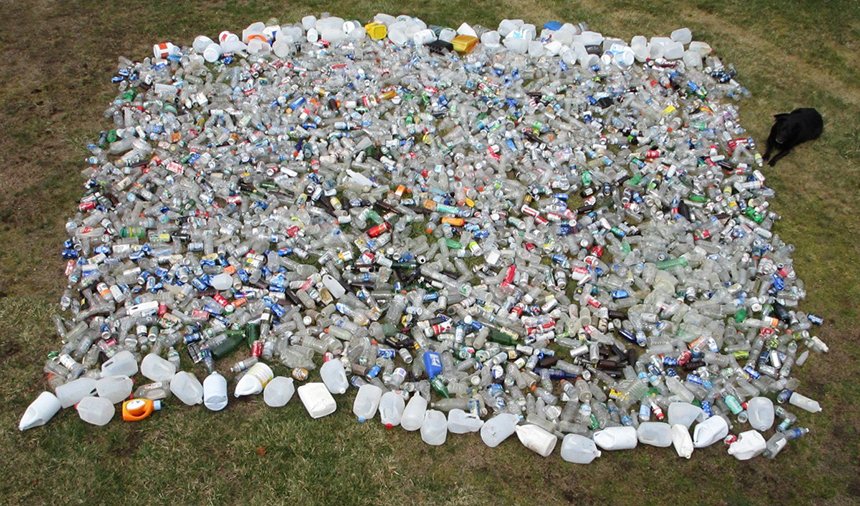Talk Talk: Rhode Island’s Efforts to Curb Plastic Pollution Mostly Words and Task Force Reports
February 2, 2022
A trio of bills introduced last month is designed to slow the tidal wave of plastics inundating the Ocean State. It is an annual conversation Rhode Island has been having for the past decade. Lobbyists, special interests and other status quo protectors have made sure it’s nothing more than talk.
“So this probably the fourth or fifth year that I’ve put this bill [Plastic Waste Reduction Act] in and before me I think it was Art Handy’s bill and before him I really don’t know whose it was,” Rep. Carol Hagan Mcentee, D-South Kingstown, said during a Jan. 27 meeting of the House Committee on Environment and Natural Resources. “But I’ll say it again, its time has come. … We cannot fight climate change without reducing our dependence on plastics — single-use plastics.”
She noted 26,000 tons of plastic bags and plastic film are buried every year in the Central Landfill. Those that make it out of the Johnston landfill — and those that never get there — wind up in parks, beaches, rivers and Narragansett Bay, and “pose a significant risk to our wildlife” and “end up in our food supply.”
“This is a simple step that we can do,” Hagan Mcentee said. “Seventeen cities and towns have already banned single-use plastic bags. It’s time we do it as an entire state.”
Bangladesh, a country the size of Georgia with a population of nearly 165 million, banned plastic bags in 2002, after it was found they played a key role in clogging drainage systems during heavy rains.
Kenya banned plastic bags in 2017 and, three years later, prohibited visitors from taking single-use plastics such as water bottles and disposable plates into national parks, forests, beaches and conservation areas.
Zimbabwe implemented a ban on polystyrene food containers in 2017, with fines of between $30 and $5,000 the punishment.
California, Hawaii and New York have banned plastic bags. Maine and Maryland and several cities, including New York and Washington, D.C., have banned Styrofoam containers.
Rhode Island mostly continues to talk about and study the impacts of single-use plastic pollution. Last year, however, the General Assembly did pass legislation to reduce the use of disposable plastic straws. The law, which took effect Jan. 1, prohibits food service establishments from providing plastic straws unless requested by a customer.
“We’ve become a very simplistic society, and we want everything simple and easy,” said Rep. David Bennett, D-Warwick, the committee chair who introduced two of the three bills. “We want everything that is convenient and in the meantime we’re killing our environment.”

Bill H7063 would ban food service establishments from providing food or beverages in packaging made with expanded polystyrene foam (Styrofoam), or from providing beverage stirrers made from plastic. The bill is intended to apply to items such as takeout containers and cups, egg cartons, and trays that hold meat.
The legislation would take effect Jan. 1, 2024, and would apply to restaurants and any other establishments where prepared food is served, including farmers markets, food pantries and nursing homes. The bill includes exceptions for hospitals and Meals on Wheels-type programs.
Styrofoam has long been used for packaging because it is cheap to produce, lightweight to ship and effective at retaining both heat and cold. However, it is not cost-effective to recycle and demand for its reuse is low. It is not biodegradable — polystyrene discarded today will hang around for nearly five centuries. It also breaks apart easily and floats, which makes it especially dangerous to aquatic animals that mistake it for food.
Bill H7064 would prohibit the sale of alcoholic beverages in containers that hold no more than 100 milliliters. While popular for their convenience — and the ease with which they can be consumed or transported inconspicuously — nips are a commonly littered form of plastic packaging in Rhode Island.
Bill H7065, introduced by Hagan Mcentee, would prohibit single-use plastic retail bags statewide. The Pet Industry Joint Advisory Council requested an amendment that excluded plastic bags “used to contain live plants or animals, such as fish or insects, sold in pet stores.”
The three bills are supported by The Nature Conservancy, Save The Bay, the Environment Council of Rhode Island, the Ocean Recovery Community Alliance, the Conservation Law Foundation, Clean Water Action, Clean Ocean Access and the Audubon Society of Rhode Island.
The New England Convenience Store & Energy Marketers Association, which represents convenience store and gasoline retailers, supports H7065 but would “prefer the penalties be less aggressive,” suggesting the committee cut the proposed penalties of $100 (first violation in a calendar year), $200 (second) and $500 (third) in half.

Pushback from the plastics/fossil fuels lobby was swift. Soon after the Jan. 27 committee hearing ended, the director of the American Recyclable Plastic Bag Alliance issued a statement.
“H 7065 bans American-made, recyclable plastic bags in favor of nonrecyclable, stitched handle plastic alternatives imported from some of the world’s polluting countries,” Zachary Taylor wrote. “Inevitably, businesses will pass the higher costs of alternative bags onto families struggling with inflation. It’s not actually a plastic bag ban, it’s not good for the planet, and it’s not good for families.”
Taylor also submitted testimony to the House committee, writing, “For many struggling consumers, H 7065 would create significant new costs at checkout when they forget their bags, which may be more likely for those who rely on public transit, work multiple jobs, or otherwise face challenges when it comes to shopping for necessities.”
The American Recyclable Plastic Bag Alliance, a trade group that represents U.S. plastic bag manufacturers, claims as fact on its website that the “conventional plastic bag is the one with the least environmental impacts.”
The American Distilled Spirits Alliance offered this defense of nips, saying a “50-milliliter bottle of spirits affords the consumer the ability to accurately measure their alcohol intake. One, 50 milliliter spirits bottle is the equivalent of a standard drink and eliminates the guesswork when portioning. Eliminating small sized spirits bottles would have the opposite effect on moderation.
“These package sizes also allow those who are price sensitive to enjoy a little taste of luxury brands they might not otherwise afford. Many people buy these small sizes for cooking, because it allows them to purchase only the portion that they need. Additionally, they allow for sampling of a variety of products offered by spirits manufacturers. With the COVID-19 pandemic, small sizes indeed offer a greater level of personal safety and hygiene.”
It’s not the first time the industry has used the ongoing public health crisis to tout plastics and undermine bag bans. Just days into the pandemic, the plastics industry began claiming, without evidence, that reusable bags could transmit the coronavirus.
In a March 18, 2020 letter to the Department of Health and Human Services, the president of the Plastics Industry Association requested a public statement from the federal agency endorsing the idea that single-use plastics are the safest choice amid the coronavirus pandemic.
“We ask that the department speak out against bans on these products as a public safety risk and help stop the rush to ban these products by environmentalists and elected officials that puts consumers and workers at risk,” he wrote.
Two days later, he issued a press release about the wholesomeness of plastics. He wrote that “single-use plastic bags provide a sanitary and convenient way to carry our groceries home while protecting supermarket employees and customers from whatever is lurking on reusable bags.”
In noting its objection to H7065, the Rhode Island state director of the National Federation of Independent Business used the industry-manufactured claim that plastic bags were safer during the pandemic.
“It is also important to remember that during the pandemic many states and communities reversed plastic bag bans due to the health risk to workers and consumers,” Christopher Carlozzi wrote. “Many health officials felt using reusable bags were used for multiple purposes, handled by different individuals, and were seldom washed properly.”
There have been no reports of reusable bags spreading COIVD-19.
These same types of talking points were featured again and again during eight months of meetings of the Rhode Island Task Force to Tackle Plastics. During a January 2019 meeting, a longtime lobbyist with the American Chemistry Council’s Plastics Division said wrapping bananas, potatoes and cucumbers in plastic would reduce food waste and effectively feed people around the globe.
He noted that the trash coming down rivers and floating in the ocean isn’t all plastic. He blamed “rapidly developing countries in Asia” for the problem of marine debris and plastics in the ocean.
He said Styrofoam is lightweight, contains very little plastic, is mostly air, and uses less energy and water than comparable paper-based alternatives.
American Chemistry Council members include Chevron Phillips, Dow, DuPont, ExxonMobil and Shell.
Plastics, including Styrofoam, are made out of petroleum and photodegrade, meaning they break down into smaller and smaller pieces, and marine animals easily mistake these bits for food. Polystyrene residues have been found in samples of human fat tissue and plastics have been found in human stool samples. Styrene exposure increases the risk of leukemia and lymphoma, and it is a neurotoxin.
Plastic production is increasing by about 9 percent annually. The numbers associated with single-use plastics, which currently account for about 40 percent of all plastic use, are staggering: some 500 billion retail plastic bags are used annually worldwide; some 25 billion Styrofoam cups are thrown out annually in the United States alone; nearly 3 million plastic bottles, every hour of every day, are used in the United States..
It has been three years since former Gov. Gina Raimondo’s task force offered its support for a statewide ban on plastic retail bags.



